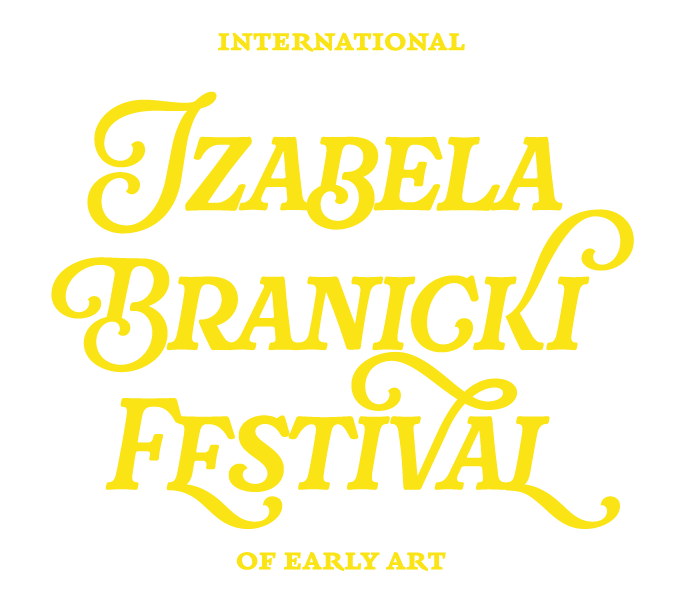
Watch on-line:
Performers:
The Starosielski Brotherhood of Singers consists of:
- Mariusz Perkowski – artistic direction, baritone, hurdy-gurdy, viola da mano, guitar
- Emilia Perkowska – soprano
- Gabriela Perkowska – alto, dulcimer
- Maciej Dziemiańczuk – tenor
- Krzysztof Frejtag – tenor
- Marcin Szaciłowski – tenor II
- Paweł Cichoński – tenor II
- Mariusz Truszkowski – baritone, bass guitar
- Karol Komenda – bass
- Artur Mądry – bass
- Mateusz Januszczyk – bass, trumpet
- Łukasz Olechno – baritone, positive organ, portative
- Wojciech Bronakowski – bass, percussion instruments
- Agnieszka Obst–Chwała – vielle
- Jan Kiernicki – lute
- Paulina Garlińska – viola da gamba:
Event description:
Knights' songs are an important and crucially needed part of Polish music. They originated in the Middle Ages and described the most important historical events in a way that was accessible and understandable to Poles. Polish knights won, faced defeat, but never gave up and always fought. Poland could call itself the bulwark of Christian Europe, and it was thanks to the Polish knighthood that Latin civilization was able to survive and develop. During the partitions, Knights' Songs served as a reminder of what Poland was: its beauty, culture, and, above all, its people of righteous character, for whom "God, Honor, and Fatherland" were always paramount. Who knows, perhaps they will also strengthen our hearts today.
The program consists of 14 songs, arranged in a historically informed manner, utilizing instruments and styles from earlier eras. Monodic and polyphonic singing is performed to the accompaniment of lute, hurdy-gurdy, positive organ, flute, percussion, and other period instruments.
Program:
Mother of God traditional
Gaude Mater Polonia trad.
Gentlemen, know vol. I m.: Theobald IV of Champagne (1201-1253), translated by Jacek Kowalski
Songs of the Slavic Calliope
t.: Stanisław Grochowski (1542-1612)
m.: Krzysztof Klabon (1550-1616)
For the present victory at Byczyna. Song I
For the present victory at Byczyna. Song II
For the present victory at Byczyna. Song III
For the present victory at Byczyna. Song IV
For the present victory at Byczyna for the Crown Hetman. Song V
For the present victory at Byczyna to this Crown Hetman. Song VI
A new song about the happy need at Byczyna by Joachim Bielski (1540-1599)
The Song of the Wandering Soldier after Aleksander Wielhorski
Knightly Pride Adam Czahrowski (1565-1599)
The Musings of Stanisław Żółkiewski t. Julian Ursyn Niemcewicz (1758-1841) m. Konstancja Narbutt (1760-1827)
The song of the Bar Confederates – I stand in the square
March of the Bar Confederates
A song about helping the Polish Crown during the war
Song for the ceremony in Horodło, town of Adam Hallmann
Knights' Circle of the town of Plenary Indulgence traditional
Starosielski Brotherhood of Singers
The Starosielskie Brotherhood of Singers has been active in Białystok since 2013. The group specializes in reconstructing and performing traditional songs derived from Polish rituals, customs, folk, and patriotic traditions. Cultivating the musical heritage of the Republic of Poland, it presents its repertoire both in ceremonial contexts and during patriotic events, such as remembrance evenings and independence marches.
In 2019, the Brotherhood, together with the Jerycho ensemble and Bartosz Izbicki, inaugurated the Izabela Branicka International Festival of Early Arts and performed at the Old Polish Culture Festival – Starosielskie Prezentacje. A year later, in 2020, they presented a new program. „Pieśni Rycerskie” podczas Dnia Tradycji Rzeczypospolitej oraz kolejnej edycji Starosielskich Prezentacji.
In 2021, the band released two albums: In Memory of May 3rd. Pieśni nabożne Franciszek Karpińskiego – featuring Monika Horodek, Witold Broda, and Bartosz Izbicki – and Pieśni Rycerskie (Rycerskie Songs). Both productions were created under the artistic direction of Mariusz Perkowski. The Brotherhood's work is very popular, as evidenced by the popularity of their music videos on YouTube – songs such as „Duma Rycerska”, „Pieśń o żołnierzu tułaczu”, „Hymn Młodych” czy „Koło Rycerskie” zgromadziły łącznie ponad 150 tysięcy odsłon.
The group also participated in two innovative musical projects: my.toPolska – a rock & rap opera, and #naszatonacja – IRYDION & Guests. In 2023, the Brotherhood held four editions of the nationwide Singing Workshops for Men, popularizing not only its repertoire but also a now-rare form of singing performed exclusively by male voices.
The Starosielski Brotherhood of Singers combines respect for tradition with a modern approach to its presentation, building a bridge between the heritage of their ancestors and the contemporary sensitivity of their audiences.
Mariusz Perkowski - artistic direction
Mariusz Perkowski graduated from the Fryderyk Chopin University of Music in Białystok with a degree in Music Education and completed the Postgraduate Choirmastering Studies in Bydgoszcz. He also completed theological studies at the Pontifical Faculty of Theology in Warsaw, and then completed doctoral studies at the Institute of Musicology of the Catholic University of Lublin, specializing in liturgical monody.
He taught voice classes at the Archdiocesan Major Seminary in Białystok and at the Private Pedagogical University in Białystok. He also taught Gregorian chant and liturgics, specializing in Church Music, at the Białystok branch of the Fryderyk Chopin Academy of Music.
As a vocalist, he has collaborated with numerous ensembles specializing in the historical performance of early music, including the Sine Nomine chamber choir, the Concerto Polacco baroque orchestra under Marek Toporowski, Piotr Zawistowski's Subtilior Ensemble, Jacek Urbaniak's Ars Nova, and Anna Moniuszko's Diletto.
He is the founder and director of three vocal ensembles: the Men's Singing Ensemble Schola Gregoriana Sancti Casimiri (since 2008), the Starosielski Singing Brotherhood (since 2013) and the Schola Mulierum Sanctae Hedvigis (since 2013).

